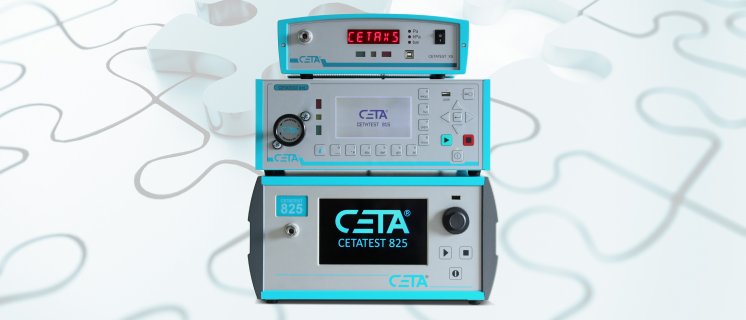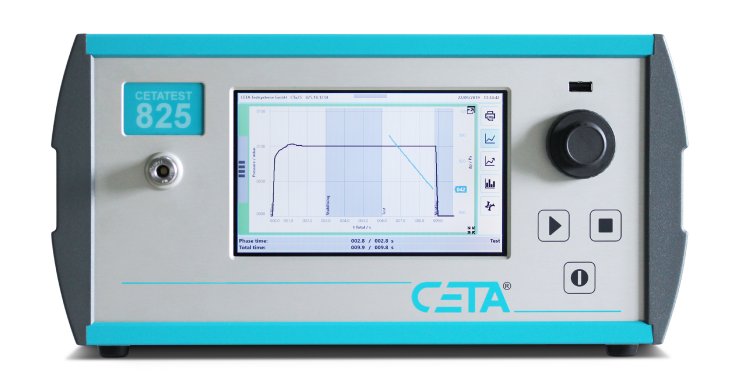Leak testing with compressed air can be used to test tightness against liquids, as the viscosity of air is lower compared to liquids. Here the differential pressure test method is often used, in which the pressure drop due to leakage is measured as a pressure difference against a sealed reference volume. The minimum leakage rates detectable with this method are in the range of 10-3 mbar*l/s. Would the leak only consist of a single hole, it would have a diameter of approx. 20 µm at a test pressure of 1 bar.
The size of the products tested for tightness ranges from small-volume microswitches with a volume of 0.1 ml up to tanks of 1,000 l capacity. Depending on the application, CETA leak testers with gauge pressure or differential pressure sensors are used. Available pressure ranges are between -1 and 30 bar up to 400 bar with the pressure rise method (e.g. testing of injection valves).
Typical leak testing applications are testing on oil and water tightness. By using suitable methods, a wide variety of products can be tested: directly fillable products (e.g. housings, gear covers, containers, lights), objects whose internal and external tightness must be ensured (e.g. ball valves, gears), components with pressure compensation elements (membranes) as well as sealed test parts (e.g. sensors, micro assemblies, watches).
For the detection of smallest leakages in large-volume test parts, leak testing devices with calorimetric mass flow sensor and various measuring ranges (up to 600 ml/min) are used. Here, the mass flow caused by the leakage is measured directly.
Very low leakage rates down to 10-6 mbar*l/s (equivalent to a hole diameter of approx. 0.1 µm at 1 bar test pressure) can be detected with hydrogen leak testers. The patented and highly sensitive method is based on the detection of gases or vapours escaping from the test part in the case of leakage. This method detects forming gas (5 % hydrogen, 95 % nitrogen), alcohols, solvents and generally volatile organic gas or vapour mixtures. These are either present in the test part itself or are supplied beforehand as tracer gas.
In addition to leak testing, there are products that are tested for flow. With the CETA flow testers, a range from 3 ml/min to 200 l/min can be measured with different laminar flow elements. Typical products of which the flow rate is tested are pipes, cooling channels, valves, exhaust systems and membranes.
The CETA testers are usually integrated into automated series production lines. A large number of common industrial interfaces are available for the connectivity.
Well-known customers from the automotive industry, e-mobility, fittings, heating and air conditioning, medical technology, packaging and appliance industries use the CETA test devices for quality assurance and to secure production.
CETA customers appreciate the longevity and the high quality of the test equipment, they honour the on-time delivery, the many years of experience and the high level of competence in solving test tasks and handling projects. Due to the high level of customer orientation, it is increasingly evident that CETA is involved at a very early stage of product development.
The company is certified according to DIN ISO 9001 and the calibration laboratory (D-K-19566) is accredited as a DAkkS calibration laboratory (according to DIN EN ISO/IEC 17025) for the measurand pressure up to 60 bar (also for on-site calibrations).
The CETA test instruments are quality products and are delivered with a warranty of 3 years, with the optional extension to 5 years.
The decision as to which test method is suitable depends on many factors, such as the special properties of the test part, the test parameters, the production cycle and the specifications for measuring equipment capability.
Finding the right test instrument for a defined application requires specific expertise. Due to many years of experience in the implementation of testing tasks, combined with own product development, CETA advises its customers comprehensively in finding the optimal solution. These added values distinguish CETA as a solution partner for industrial testing tasks.
Exhibitions 2019
Motek, 07. - 10. 10.2019, hall 3 / 3320 Stuttgart
COMPAMED, 18. - 21.11.2019, hall 8a / L25 Düsseldorf
DGZfP, 8. Seminar leak testing and leak detection, 24. - 25.09.2019, Dortmund
Kunststoffinstitut Lüdenscheid, 3. Branchentreff-Lüdenscheid, 06.02.2020, Lüdenscheid



